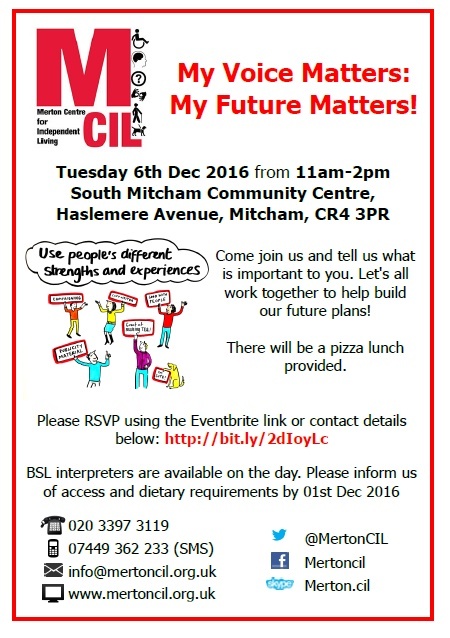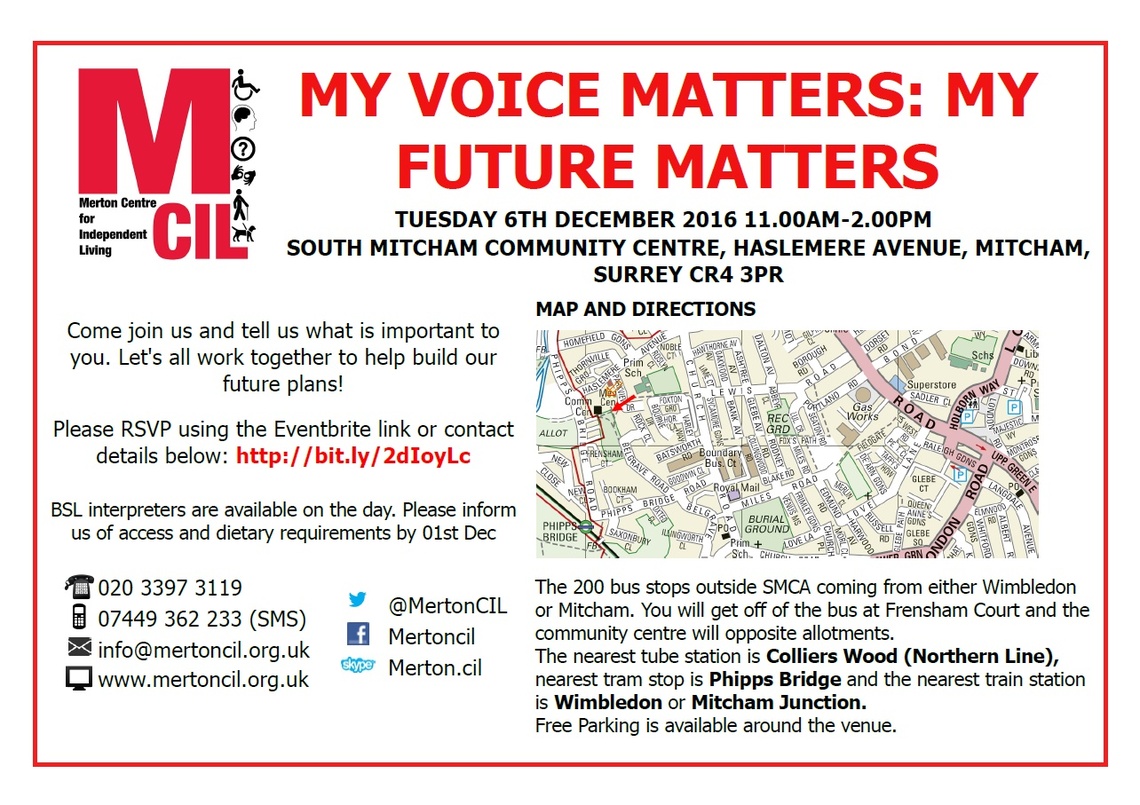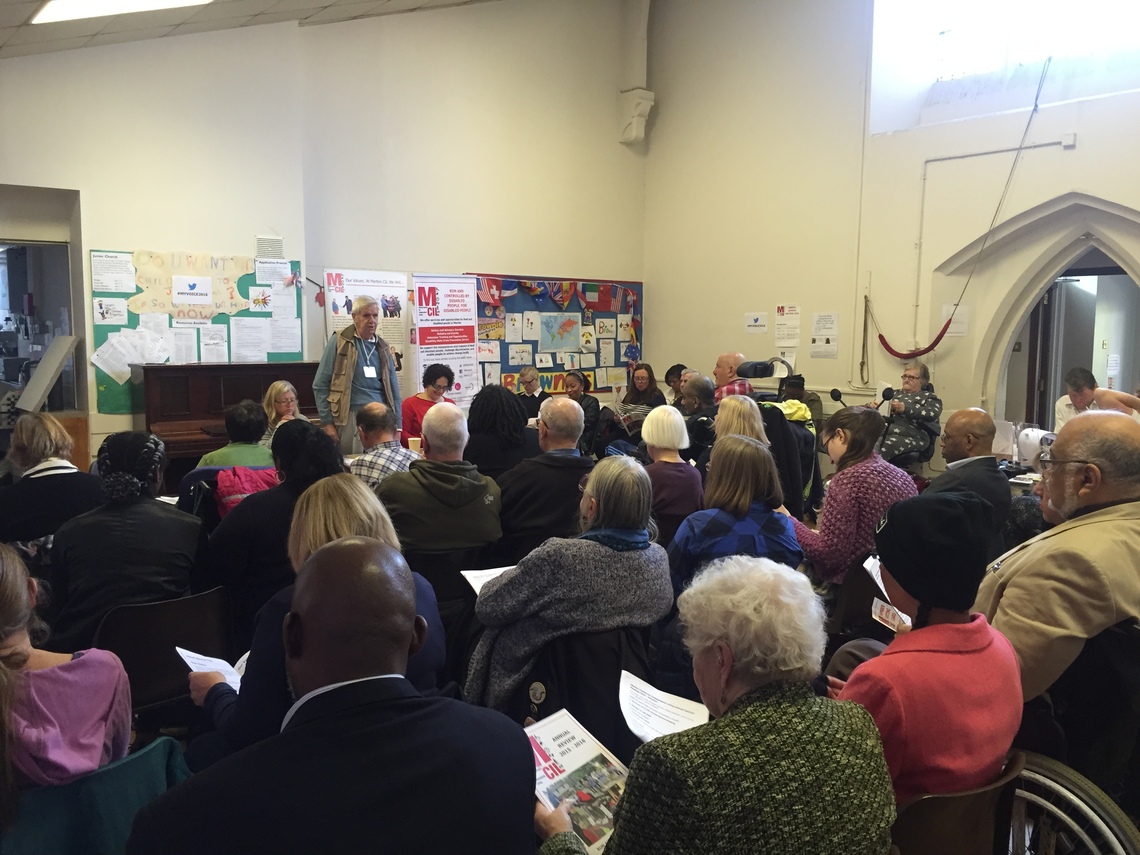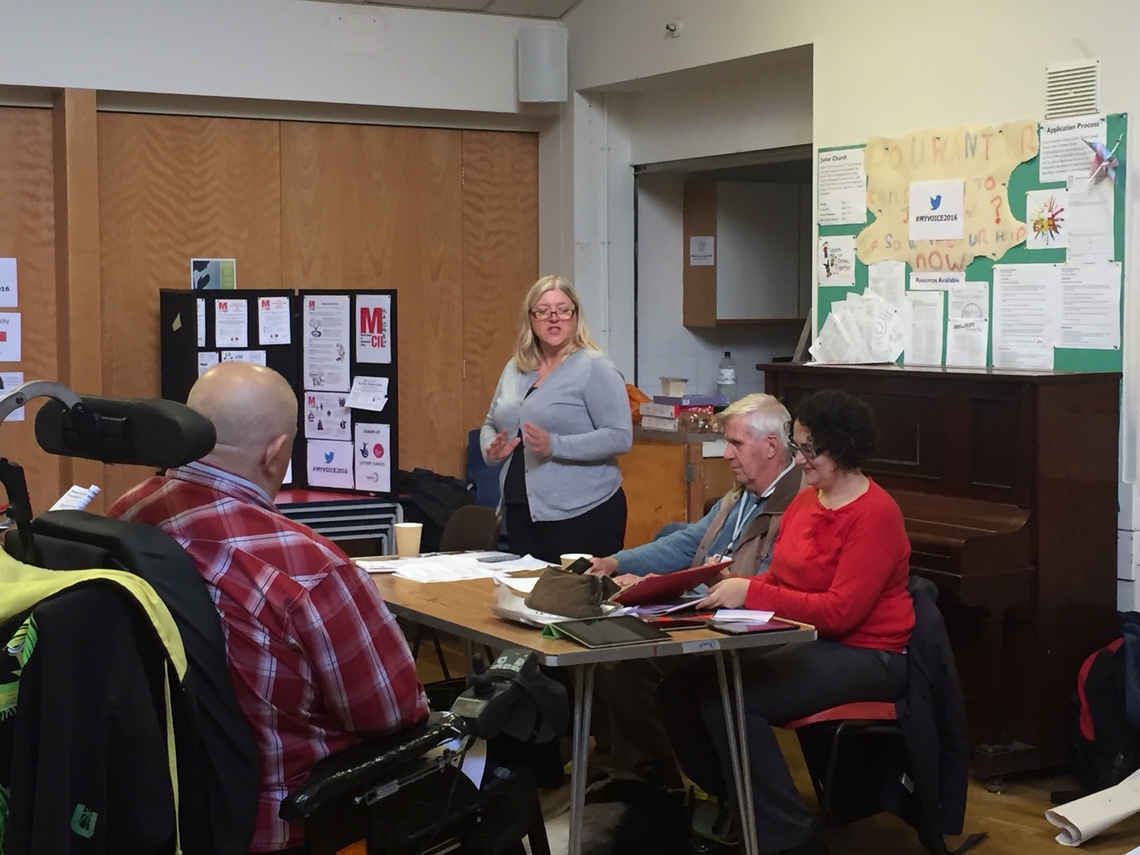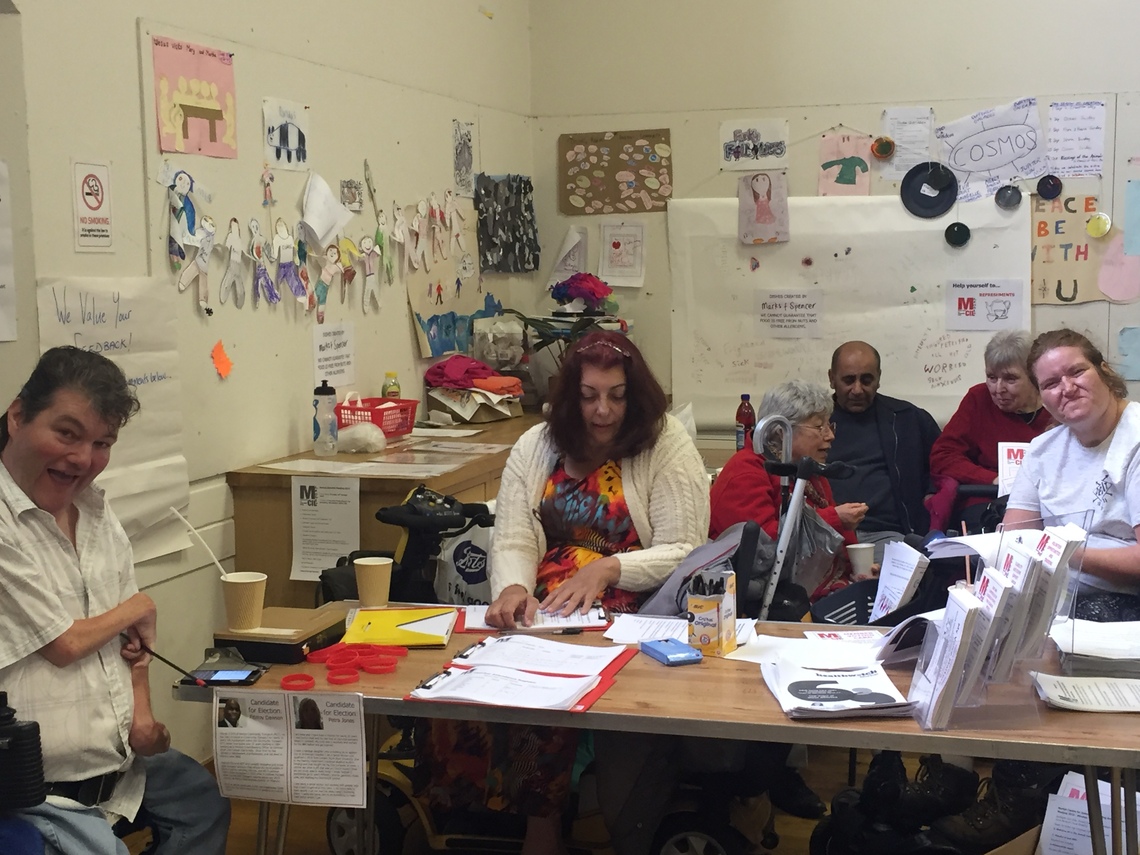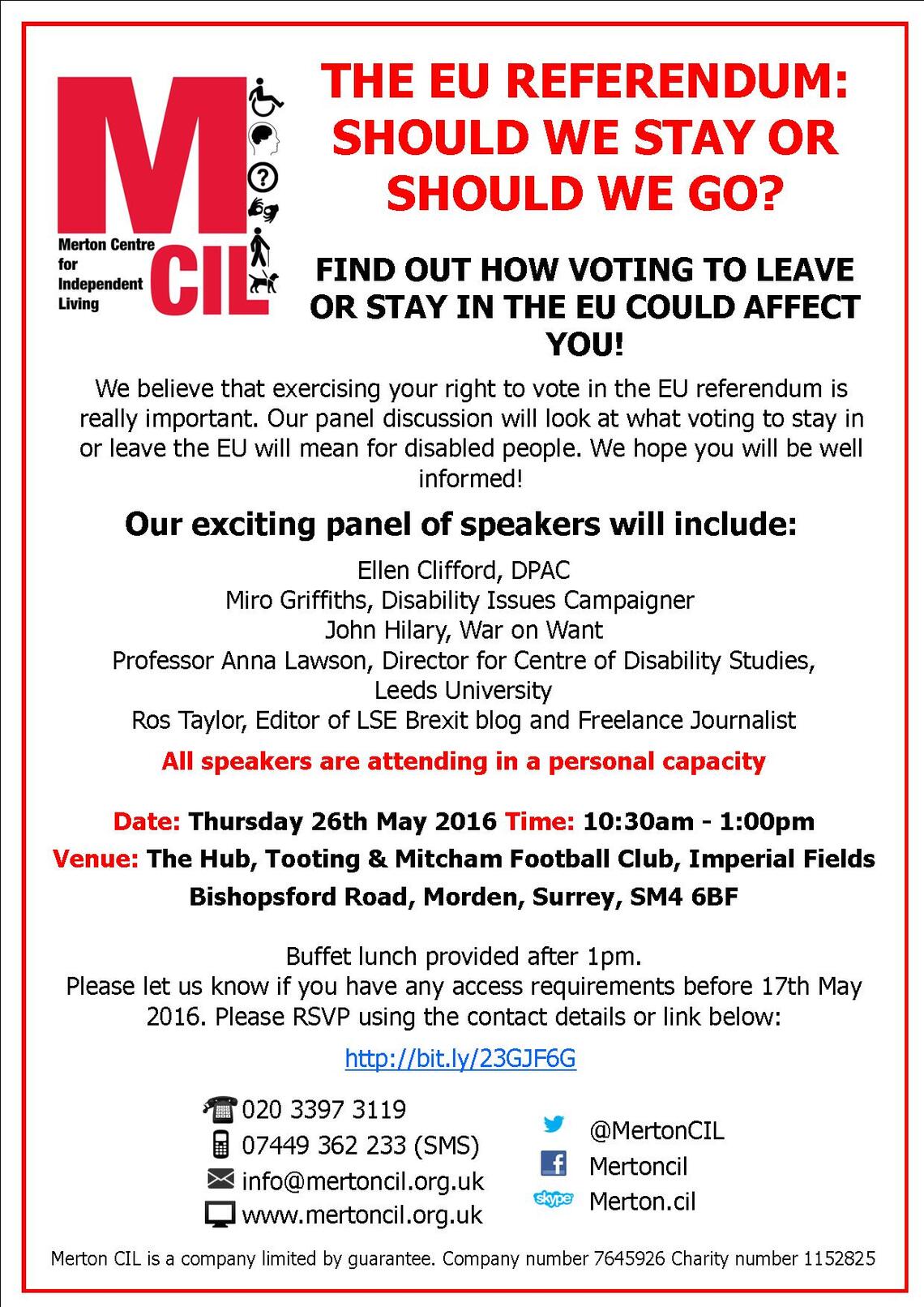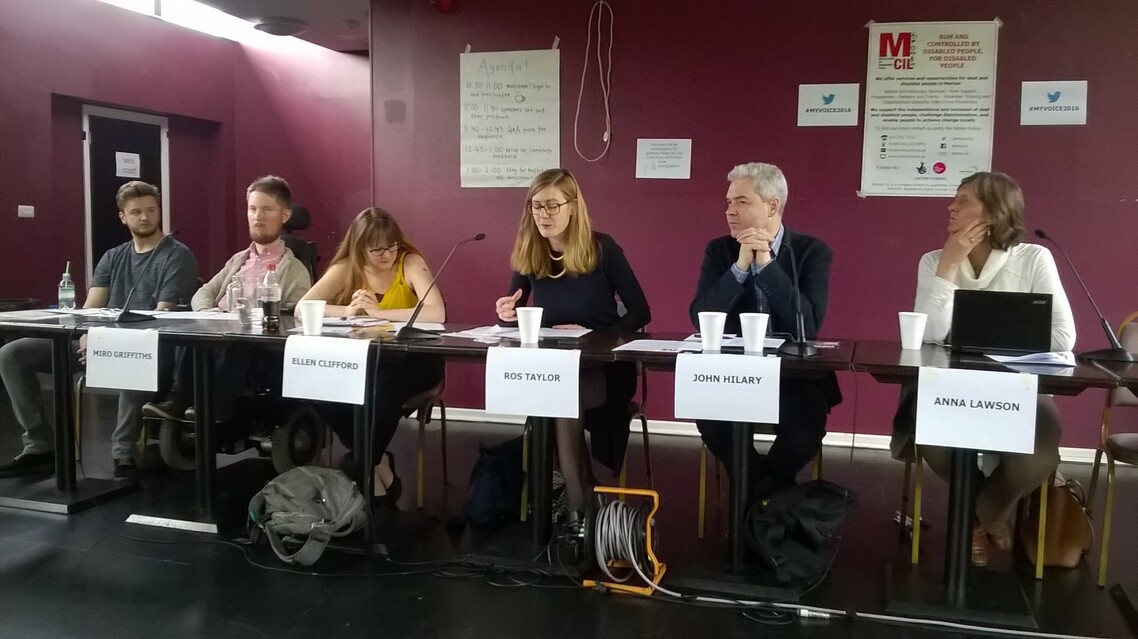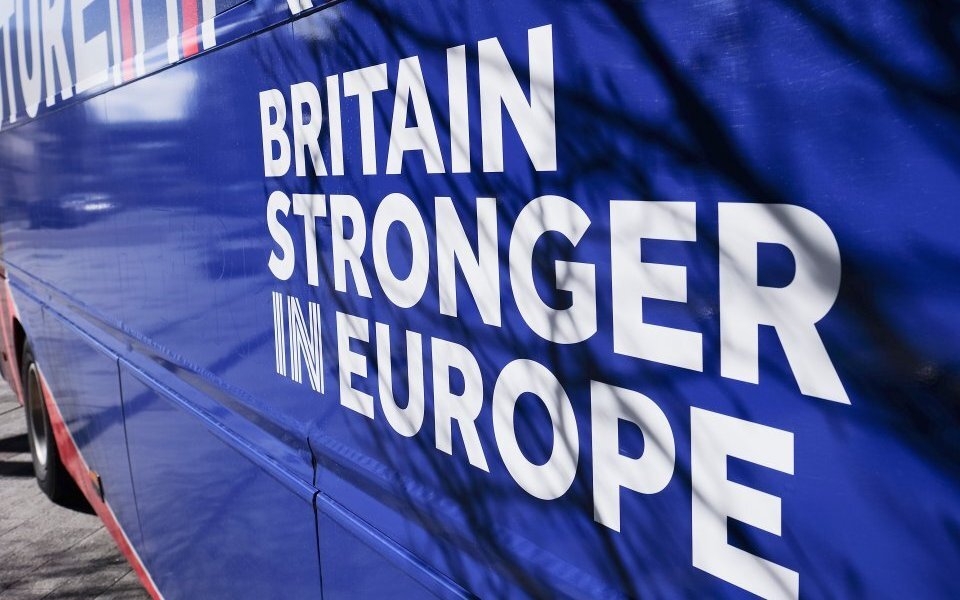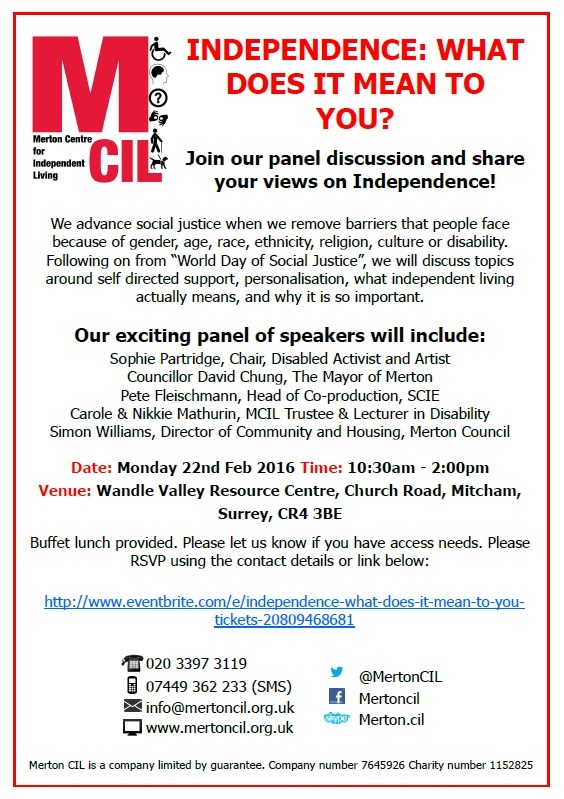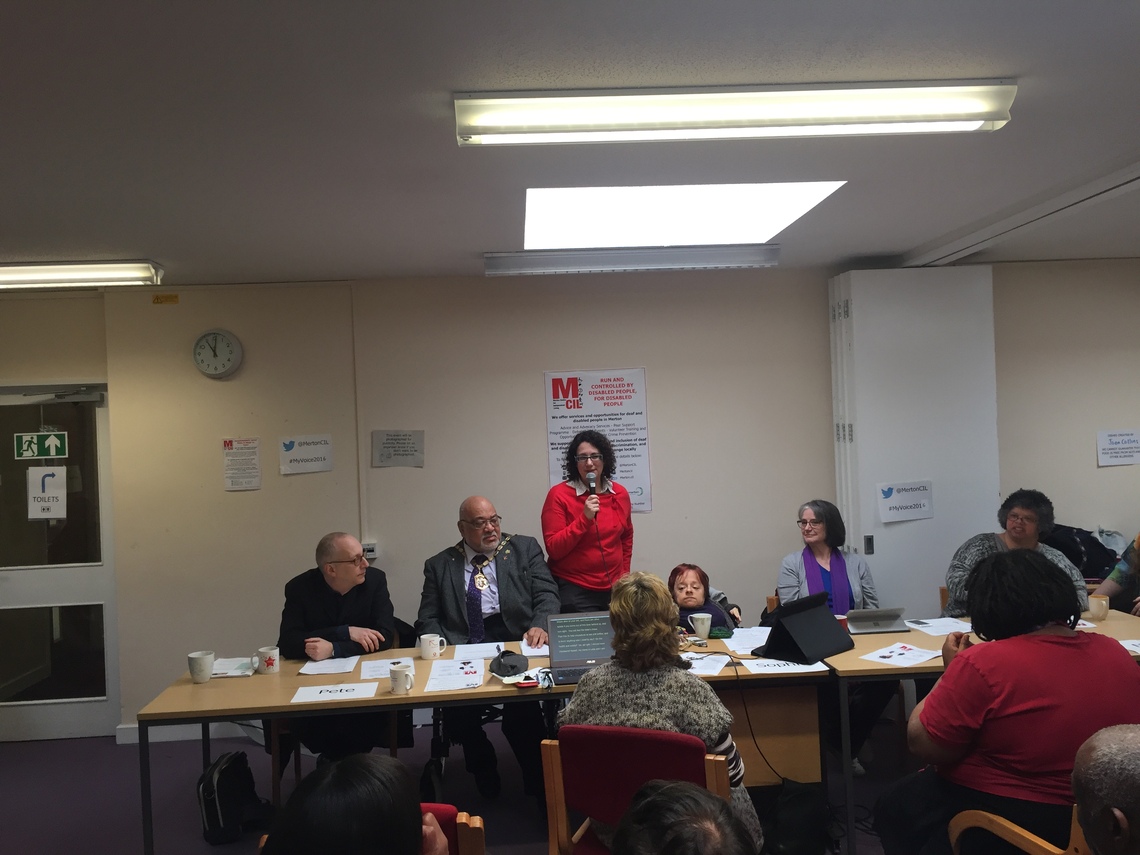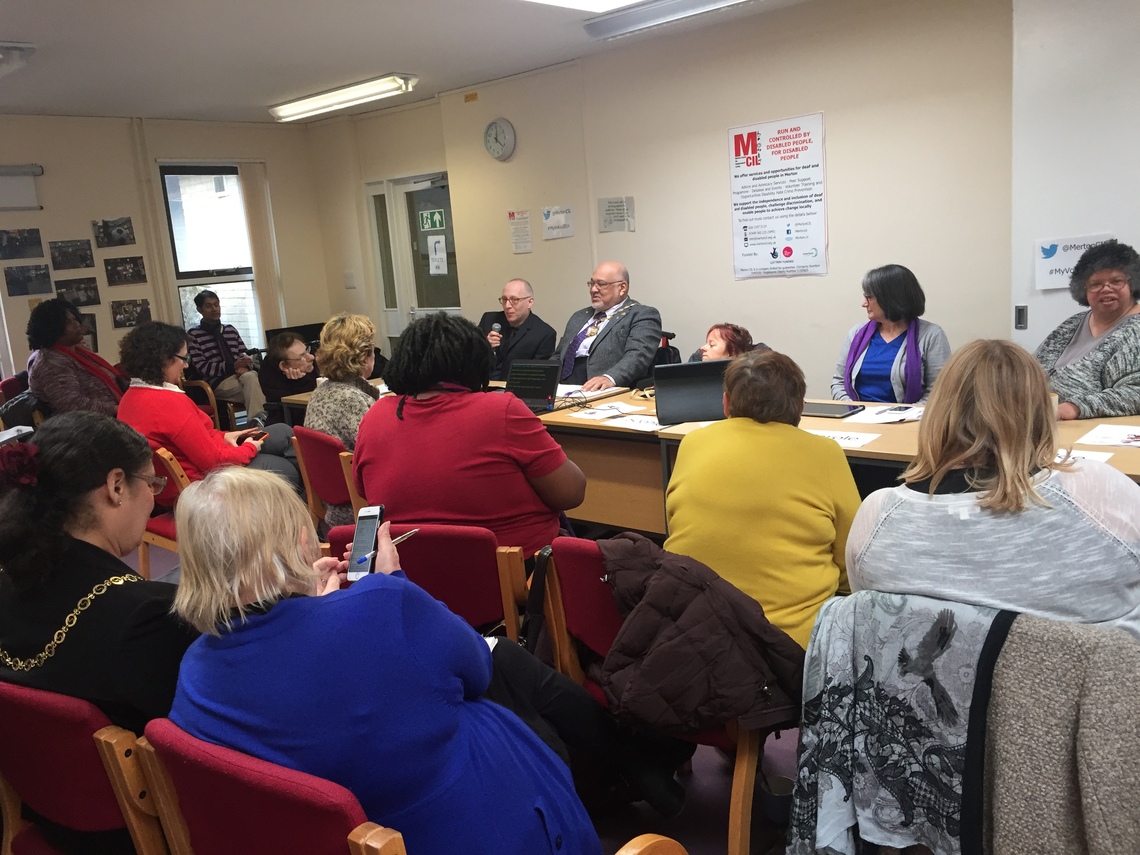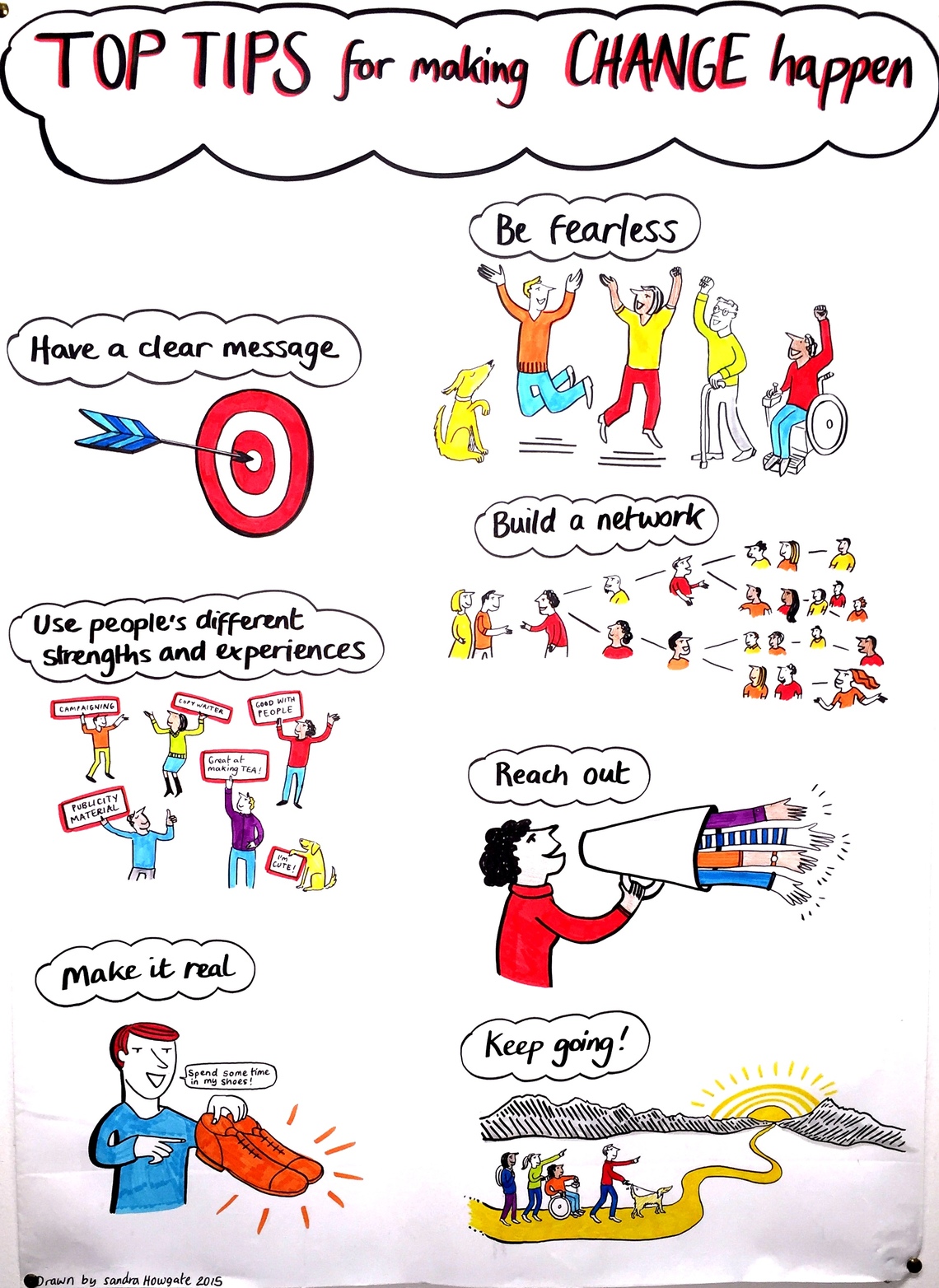Find out more about our previous events here!
My Voice Matters 2016 - My Future Matters
Come along to this year’s My Voice Matters event to discuss the issues that are important to you. With all of our voice combined we can work together to build our future plans.
The event is being held at The South Mitcham Community Centre, Haslemere Avenue, Mitcham, Surrey, CR4 3PR.
The 200 bus stops outside the Centre coming from either Wimbledon or Mitcham. You will get off of the bus at Frensham Court. The nearest tube station is Colliers Wood (Northern Line) the 200 bus stops outside here you will get on in the direction of Mitcham, nearest tram stop is Phipps Bridge and the nearest train station is Wimbledon or Mitcham Junction.There is free Parking is available around the venue.
We have BSL interpreters booked on the day and a Pizza lunch will be provided. Please inform us of any access or dietary requirements by 1st Dec 2016.
Please RSVP using the link below or using our contact details.
https://www.eventbrite.com/e/my-voice-matters-2016-tickets-28528499510
We look forward to seeing you all there!
Annual General Meeting 2016
This years’ Annual General Meeting was held on Thursday 20th October 2016 at The Holy Trinity Church, Wimbledon. There were 46 attendees, 37 of those being members with voting rights.
Our Chair Roy Benjamin discussed some of our achievements over the past year. He mentioned how our services had grown, we now had a service manger in place and we were supporting more local disabled people that we had ever before.
Our policy work was a hot topic. There was a highlight on the work that we had done on both a parliamentary and local level. As well as our battle to get the voices of disabled people heard regarding cuts.
Roy ended by thanking volunteers, funders, staff and our CEO Lyla for all of their hard work and support.
Treasurer Fiona Ringwood discussed our financial statements from 2015-16. She mentioned that we had a positive year with our income increasing by 60%.
Two great new trustees were elected by members
1. Fitzroy Dawson - CEO of Merton Community Transport. Fitzroy would like to see a focus on access and disability.
2. Petra Jones – a Merton resident and social worker with a hearing impairment. Petra would like to ensure we improve social work and fight against cuts
They will be great additions to our board and we look forward to working with them.
We also discussed a special resolutions document that was sent to all members in the post. We are introducing a two tier structure to our membership. Disabled people will be full members with voting rights and non disabled people will be supporters. This is to ensure that we remain an organisation run and controlled by disabled people.
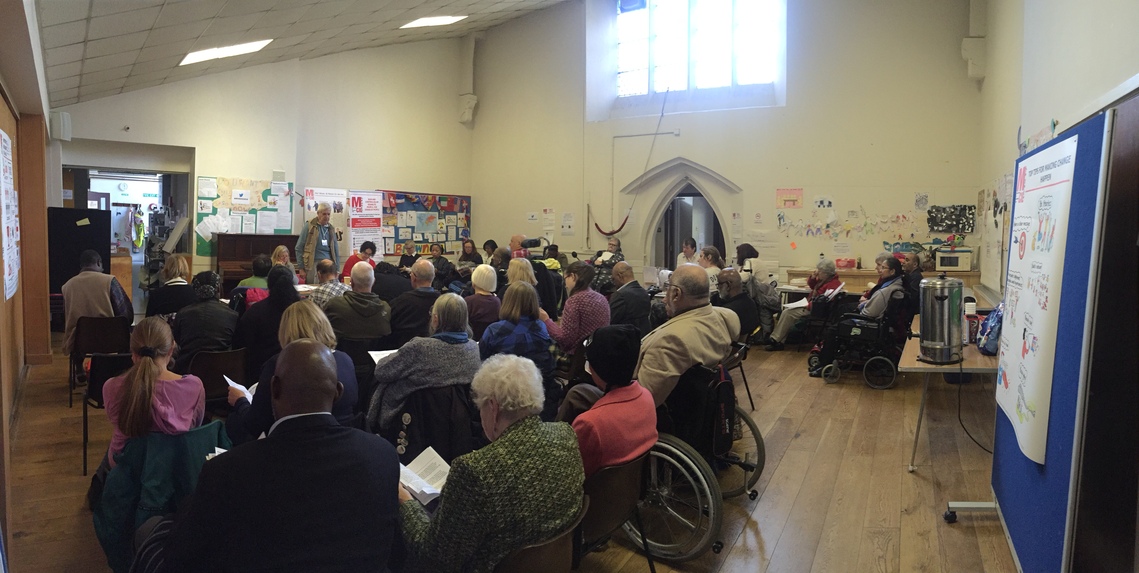
The close of formal business was followed by a facilitated discussion on Merton CILs strategic direction. We received a lot of interesting feedback that will help to further shape the conversations we will be having at this year’s My Voice Matters event. Please keep an eye on the website for more information and hold the date!
We closed the event with lunch and members completed our annual survey. If you were unable to attend the event or would like to complete the survey – please do so below. We would love to hear from you!
Thank you to everyone that attended and helped out at this year’s Annual General Meeting.
You can view our Annual Review and Financial Statements for 2015/16 here - http://www.mertoncil.org.uk/about-us/annual-reports/
Read minutes from our 2015 Annual General Meeting here - Merton CIL AGM Minutes 2015
Meet the Trustees Tea Party
Merton CIL is a disabled people’s user-led organisation. This means that at least 75% of our board are disabled people. We promote the inclusion, choice, and independence of disabled people in Merton. We were established to provide a voice for disabled people in the borough and to provide support to disabled people in all areas of their lives. As part of our ongoing strengths building as an organisation, we are looking for some outstanding candidates to join our dedicated board of trustees. We will be hosting a party with a twist, where you will get to meet staff and current trustees. If you think you might be interested, come along and find out more, we would love to meet you!
Date: Thursday 14th July 2016 Time: 6.30pm to 8pm
We are looking for someone who can actively contribute their views, brings lived experience to the trustee role, and is able to question and challenge the organisation and always work in the best interests of Merton CIL. We will particularly value the following experience:
• Legal, HR, or IT background • Experience in Mental Health or Learning Disability • From a BME or other minority background • Relevant life experience
We can offer training in disability equality, the support of your colleagues on the board, and we will work with you to identify any access needs that we can support you with. If you would like to register your interest and be sent any updates regarding this event please email info@mertoncil.org.uk and please do keep an eye on our social media platforms and website for more information
The EU Referendum: Should we stay or should we go? 2016
Merton CIL Prefers the Frying Pan, to the Fire
Background
Merton Centre for Independent Living is a user-led disabled people’s organisation run by disabled people, for disabled people. We recently held a debate on the EU Referendum. We held this event because really very little discussion has been had on the impact of leaving or remaining in the EU on disabled people, and disabled people’s lives. As well as all the national issues that are being debated, like the economy, sovereignty, the environment, or control over our borders, there are some specific issues for disabled people to consider.
At the debate we had 2 panellists supporting a “stay in” position, 2 panellists supporting a “leave” position, and a neutral Chair. The speakers were a mix of academics and activists, all with an understanding of disability or poverty. There were no politicians on the panel, as we are a non political organisation.
Here we present the case for leaving the EU and the case for staying in the EU and come to a conclusion about what we think the best outcome would be for disabled people.
The case for leaving the EU
Our speakers put forward a position which opposes the EU, in particular the EU’s commitment for cuts and privatisation, and an austerity agenda that makes disabled people and the poor pay for financial crises we didn’t cause. This position says that not only has being part of the EU done nothing to stop the cuts imposed by the Government under the austerity agenda, the EU has actively enforced cuts and austerity in other countries such as Greece, Portugal, Ireland and Spain, impacting on disabled people and their communities there.
Our experiences as disabled people living under austerity in the UK bear out the adverse impact of neoliberalism and privatisation. We have discredited companies like Atos and Maximus making a profit from running benefit assessments that aren’t fit for purpose and cause untold suffering and harm. We know that privatising education through academisation has negative impacts on disabled people’s right to inclusive education, with schools selecting and discriminating against pupils with learning support needs.
The European Union is about a business agenda. It’s about something that is good for the big corporations that want to have freedom of capital and the freedom to trade and invest as if there are no borders in Europe. In the past there were progressive directives brought in through “Social Europe”, particularly anti-discrimination and workplace rights, and we still have the legacy of those rights. But, European Union institutions jettisoned the Social Europe agenda years ago. There is now a rush to privatisation. For example, TTIP is a specific agreement, being signed by the members of the European Union, with the USA. If the UK is no longer a member of the European Union, it cannot be part of TTIP, although it is perfectly possible that in the future we would join something similar.
Our speakers felt that it is an illusion that progressive change comes from on high. Real change can only be effected from grassroots movements below. Attributing so much credit to institutions like the EU for the introduction of measures to progress disabled people’s rights is offensive and denies the enormously important role that disabled campaigners themselves have played in demanding and securing change.
There is no automatic link between EU membership and higher standards of support and inclusion for disabled people. If we look across Europe, we see routine treatment of disabled people that’s scandalous. An exposé by the French newspaper Libération in 2014 revealed the terrible conditions suffered by thousands of disabled people sent to live in institutions in Belgium, while caged beds are still routinely used in some areas of Europe. In Norway, which is not an EU member, disability benefits are a universal right, while in EU member states these are increasingly limited. The argument that disabled people in the UK have too much to lose by leaving the EU is insufficiently convincing to justify voting in favour of an institution that acts so clearly in the interests of the 1%.
Regardless of the outcome of the EU referendum, some politicians in the Conservative Party are determined to take us out of the European Convention on Human Rights, which is separate to the EU.
In conclusion, our speakers felt that a vote to leave the EU would strike a blow against austerity, cause chaos in the Government, and would help the struggle for the rights of disabled people.
The case for remaining in the EU
Our speakers argued that there is a much better chance of getting near to the sort of inclusive and accessible world we want if we’re inside the EU, than if we’re outside it, because the EU gives us added opportunities to go forward and protects us against the risks of going backwards.
The EU gives us, at the grassroots level, opportunities for using structures to push for change and make things better. It does this because it fosters collaboration and exchange. We wouldn’t have organisations like the European Network on Independent Living, without the EU. We wouldn’t be able to participate in it if we weren’t part of the EU. Organisations like the European Disability Forum and others have strengthened the European Disability movement, given an opportunity to grassroots organisations to come together, compare experiences, and think of creative ways forward.
We’ve heard a lot in national campaigns about all the money that we as the UK pay into the EU, but we haven’t heard so much about the money that comes back from the EU, and how that’s spent. In the billions of pounds that come back to the UK in structural funds, disabled people’s organisations have benefited. It’s estimated that in 2013-2014, 78,000 disabled people benefitted from EU funds to help them get back into work. In addition, accessibility and independent living are express priorities and preconditions in European funding.
There has been some important legislation at an EU level on discrimination, which has strengthened our discrimination laws significantly in relation to disabled people. Also, on accessibility of transport, air travel, requiring accessibility and assistance, coach travel, and train travel. In addition, there are proposals on the table for very exciting new legislation like the European Accessibility Act. It would mean that manufacturers have to comply with accessibility standards when they’re making phones, when they’re making computers, when they’re making eBooks, when they’re making ATM machines in banks or designing services like transport or banking, including online services that we use for buying tickets. All those would have to be accessible, and if they weren’t, they couldn’t be put on the market. Incidentally, it’s the UK government that’s causing a blockage to these innovations.
Our speakers felt that the debate should recognise that the approach taken by the UK government is to deliberately attempt to undermine the EU when it comes to issues of social justice and rights. In fact, the previous Coalition government put the Equality Act on the Red Tape Challenge list because it regarded equality law as bad for business. It couldn’t repeal it then because we were party to the EU. If we leave the EU, this could be repealed.
On the European Convention on Human Rights (EHRC), it’s a pre-condition for any country joining the EU that it’s also signed up to the EHRC. So, if we stay in the EU, that’s going to make it very difficult for us to leave the EHRC, which does contain a number of protections for disabled people and has been used for example in cases fighting the Bedroom Tax. If we leave the EU, then it’s going to be a lot easier for the Government to remove the UK from the EHRC, as has been suggested they want to do.
There is a risk of significant economic damage if we leave the EU. There are contesting views on that, but there are a lot of authoritative sources saying it’s a serious risk. If that happens, the recession is going to deepen, and who will have to pay the price? Disabled people, as always.
In conclusion, our speakers felt that nobody agrees how the UK would function post-referendum if we were to leave. We could end up with a destabilised government or renewed austerity targeting disabled people, as well as regression of our rights.
In Conclusion
As described by one of our speakers, to a certain extent, this is a choice between the frying pan and the fire, and there are strong feelings on both sides of the debate. What is clear is that this is very likely a forever decision which affects not just us, but also future generations, so we need to get it right.
Clearly, the EU is not perfect, and the inclusion of disabled people and stronger rights needs to be fought for by disabled people ourselves. In addition, the specific context for disabled people in the UK is that under austerity, disabled people’s rights are regressing, and we need to speak up against this.
We recognise that disabled people, our members, service users, staff and supporters, will have a range of views and backgrounds which will influence they way they will decide to vote. The most important thing from our perspective, is that disabled people speak up, and do vote in this Referendum, regardless of the position they take.
However, on balance, based on the evidence currently available, our position as an organisation is that it would be better for disabled people if we remain in the EU. We have come to this decision primarily because we believe that leaving the EU carries a greater risk for disabled people, and a greater chance of having our rights eroded, than remaining in the EU. In essence, we prefer the frying pan, to the fire.
Please see coverage of the event via SW Londoner - from 8:14
Further information
We would like to thank our speakers as well as the audience at the event on 26 May 2016 for an informative, robust, and civilised debate. Our speakers were:
- Ros Taylor (Chair), editor of LSE Brexit blog and freelance journalist
- Ellen Clifford, works with Disabled People Against Cuts and a number of disabled people’s organisations, and is a campaigner and activist
- Miro Griffiths, is a Disability Issues Campaigner and Teacher/Researcher at Liverpool John Moores University
- John Hillary, is Executive Director of War on Want whose mission is to fight the root causes of poverty, inequality and injustice.
- Professor Anna Lawson, Director for Centre of Disability Studies, Leeds University
Please do remember that all our speakers attended the event in a personal capacity and were not representing the organisations they are involved with.
For more on the issues and to inform yourself, below there are a number of links to articles for both an in and an out position, on our website, as well as neutral positions. We hope you find these articles interesting and informative
Ros Taylor chaired the event and is editor of the LSE BrexitVote blog which aims to inform the debate surrounding the referendum on Britain’s membership of the European Union with accessible commentary and research: http://blogs.lse.ac.uk/brexitvote/recent-posts/
Labour Member of the European Parliament Richard Howitt has said current and pending European legislation will greatly improve the rights of disabled people. To read the full article, please see the links:http://www.theguardian.com/social-care-network/2016/mar/11/brexit-could-undermine-the-rights-of-disabled-people http://www.eurolabour.org.uk/ten-million-disabled-people-will-lose-out-if-uk-leaves-eu
Dr Bronaygh Brynagh a lecturer from Queens University London specialising on disabled policy also agrees.To read these views, please see the link: http://qpol.qub.ac.uk/brexit-and-disabled-people/
Ellen Clifford, from DPAC, and one of our speakers, says we should leave the EU: http://dpac.uk.net/2016/03/eushould-we-stay-or-should-we-go/ and supports the left leave campaignhttp://www.leftleave.org/ rather than the official leave campaign (see below)
Debbie Jolly, from DPAC, says we should stay:http://dpac.uk.net/2016/03/why-we-should-say-yes-to-the-eu/
Anna Lawson (Professor of Law and Director of the Centre for Disability Studies, University of Leeds), Gerard Quinn (Professor of Law and Director of the Centre for Disability Law and Policy, NUI Galway) and Hywel Ceri Jones (former co-chair of the European Consortium of Foundations on Disability Rights) have written to argue that Disabled People and their Families are Stronger and Safer inside the EU. Anna was one of our speakers at the event. How EU benefits disabled people
Vicky Dermott CEO of disabled Charity Papworth Trust says Cameron should negotiate a better deal within the EU for more disabled rights. Please see the full article below:http://www.huffingtonpost.co.uk/vicky-mcdermott/forgetting-something-prim_b_9112192.html
The Papworth Trust have published their views on the EU Referendum too: here
One of our speakers was Miro Griffiths, campaigner, lecturer, and researcher and he is quoted in this article from from Disability News Service: http://www.disabilitynewsservice.com/brexit-would-have-dire-consequences-for-disabled-people/
Another speaker was John Hillary, and he has written about his concerns with the EU and in particular the TTIP, you can find out more here: https://www.opendemocracy.net/author/john-hilary-0
Another site offering a range of options is Through the Roof:http://www.throughtheroof.org/briefing-on-the-eu-referendum-from-a-disability-standpoint-ros-blog/
The Joseph Rowntree Foundation have prepared some briefings on how the outcome of the EU Referendum could affect people in Poverty: here
SPECTRUM Centre for Independent Living commissioned some research on the impact of Brexit on disabled people, and based on that have come out in favour of a “Remain” position. You can read more on that here:https://spectrumcil.wordpress.com/2016/04/27/vote-to-stay-in-europe-spectrum-urges/
Official Campaign Wanting to Leave the EU
The ‘Leave.EU’ campaign is the official group lobbying for Britain to no longer be a part of the European Union.
Website: http://leave.eu/
A few of the politicians involved in the ‘Leave.EU’ campaign are listed below:
- Conservatives such as Michael Gove, Boris Johnson, Iain Duncan Smith.
- Labour MPs, including Gisela Stuart and Graham Stringer
- UKIP’s Douglas Carswell and Suzanne Evans
- the DUP in Northern Ireland.
Official Campaign Wanting to Stay within the EU
‘Britain Stronger in Europe’ is the official group campaigning for Britain to remain in the European Union.
Website: http://www.strongerin.co.uk
A few of the politicians involved in the campaign are:
- Conservatives Prime Minister David Cameron and George Osborne
- Most Labour MPs, including party leader Jeremy Corbyn
- the Lib Dems,
- Plaid Cymru,
- SDLP in Northern Ireland
- Green Party
The information above is taken from this handy BBC guide:http://www.bbc.co.uk/news/uk-politics-32810887
For an EasyRead special on the Referendum, check out EasyNews produced by United Response by following the link http://www.unitedresponse.org.uk/easy-news or use the downloadEU_Referendum_Special
Mencap have also produced an EasyRead version, which can be downloaded here: EU_referendum_final
Mayoral Elections 2016
The Mayor of London and London Assembly Elections – Your vote is important, use it!
On May 5th 2016, Londoners will get a chanceto have their say in electing the next Mayor of London and Greater London Assembly members.
There are 1.2 million Disabled people in London and the London elections are a good opportunity to get our issues on the agenda. We remain one of the most excluded groups in the city, therefore it is important that Disabled people take part in the London elections and get our voices heard.
The needs of disabled people and the issues that matter most to them are often overlooked by politicians and policy-makers. In the current climate when, for the first time in the history of social policy, things are getting worse for Disabled people, it is more important than ever that our voices are heard. No vote, no voice.
The incomes of Disabled Londoners fell by 29% over the five years from 2007/8 to 2012/13 – double the equivalent figure for non-Disabled Londoners. Meanwhile Disabled Londoners experience inequality in every area of our lives such as housing, education and transport.
The Mayor of London and Greater London Assembly have significant powers that can address disadvantage and enable Disabled Londoners to participate as active citizens in the life of the capital city. (via Inclusion London)
Who you can vote for:
Sadiq Khan – Labour Party
“London gave me the chance to go from the council estate where I grew up to helping run a business and serving as Transport Minister. I’m running for Mayor to give all Londoners the same opportunities that our city gave me. I’ll be my own man. I have the right values, experience and vision to tackle the Tory housing crisis and be a Mayor for all Londoners.”
The council estate boy who will fix the housing crisis
- Giving Londoners – not overseas investors – first dibs on affordable new build homes.
- Making renting more affordable and protecting the green belt.
The bus driver’s son who will put an end to Tory fare hikes
- Freezing all TfL fares for four years, in a fully funded plan, protecting investment and improving services.
- Bringing in a new, one-hour bus ticket called “The Hopper” and improving suburban rail services.
The British Muslim who will take on extremists
- Keeping Londoners safe will be Sadiq’s top priority – he will challenge the extremists who threaten our safety.
- Bringing back real community policing and tackling knife crime.
The business experience to help firms succeed
- Creating new jobs, training Londoners in the skills our economy needs and protecting space for businesses.
- Ensuring more Londoners are paid the London Living Wage and that it reflects the cost of living.
The family man who will make London a better place to live
- Taking real action to cut pollution and make cycling safer.
- Protecting the Freedom Pass and supporting all of London’s communities.
Zac Goldsmith – Conservative Party
Standing up for a Greater London! Only with a strong economy, competent management and a constructive relationship with the Government can the Mayor get things done for London. Zac Goldsmith is the only candidate who can work with this Government to secure the funds and powers needed to deliver his Action Plan for Greater London.
Zac’s Action Plan for Greater London
Over the next four years if elected as Mayor I will work with the Government to:
Start fixing London’s housing crisis by:
- Doubling home building to 50,000 a year by 2020 and ensuring development is in keeping with the local area
- Giving Londoners the first chance to buy new homes built in London
- Ensuring a significant proportion of all new homes are only for rent and not for sale
Improve the capacity and reliability of London’s transport system by:
- Ensuring the Night Tube goes ahead, starting Crossrail 2, and growing the rail network
- Bringing suburban rail services under the Mayor’s control to increase and improve the service
- Protecting the Freedom Pass
Improve London’s living environment by:
- Protecting the green belt from development
- Tackling air pollution with tougher rules on HGVs, and encouraging greener vehicles and safer cycling
- Creating more green spaces and cleaning up local parks so they are safe to visit and enjoy
Make London’s streets safer by:
- Protecting neighbourhood police teams and keeping them on the street
- Tackling the root causes of crime in local communities
- Putting more police on public transport at night
Caroline Pidgeon – London Lib Dems
#CarolineCan … sort out London’s housing
As Liberal Democrat Mayor for London, Caroline Pidgeon will build 200,000 new homes.
Caroline will crack down on rogue landlords, ban unfair letting agent fees and give tenants more rights when their landlords sell up.
#CarolineCan … make London safer
As Liberal Democrat Mayor for London, Caroline Pidgeon will put 3,000 more police on our streets.
Caroline will break the cycle of violent crime by placing youth workers in A&E departments and set up educational projects in schools.
#CarolineCan … give children a great start
As Liberal Democrat Mayor for London, Caroline Pidgeon will expand wraparound childcare, train more childminders and offer more after school support. This will give real help to hard pressed parents.
#CarolineCan … make transport work for us
As Liberal Democrat Mayor for London, Caroline Pidgeon will introduce half price fares before half seven on all tube, DLR, Overground and TfL Rail journeys. She has costed popular plans for a one hour bus ticket.
Information Booklet
Starting from mid-April 2016, all Londoners who are registered to vote will receive an information booklet in the post. The booklet will include mini-manifestos from the Mayoral candidates*, lists of candidates/parties standing in the London Assembly contests and information on how to vote.
Download the information booklet.
If you would like to receive the booklet in large-print or braille contactinfo@londonelects.org.uk / 020 7983 4444
You can listen to an audio version of the booklet on SoundCloud or listen below.
*Each candidate was given the chance to put a mini-manifesto in this booklet. 10 candidates chose to do so and paid £10,000 towards the booklet’s cost. This is the amount required by law. Lots were drawn to decide the order in which the mini-manifestos appear in this booklet.
Information for carers & people with a disability
Everyone should have their say on 5 May 2016; having a disability should not be a barrier to participating in the elections for the Mayor of London and London Assembly.
There are a number of options to help those with a physical or learning disability cast their vote. Voters may request a postal vote or a proxy vote, where someone votes on their behalf according to their wishes. Help will also be available at polling stations, including large print ballot papers, Braille tactile voting devices and assistance from polling station staff.
Below you can find further information and an ‘easy read’ guide to voting for those with learning difficulties.
https://www.londonelects.org.uk/im-voter/information-carers-people-disability
Figges Marsh By-Election
The Figges March by-election will take place on the same day as the London mayoral elections, on Thursday 5th May 2016.
The seat has been vacant since the sudden resignation of Labour councillor Peter Walker on March 2 in protest to the cuts to adult social care.
The five candidates campaigning to replace him are:
- Mike Brunt (Labour Party)
- Hamna Qureshi (Conservative Party)
- Rachel Waitt (London Liberal Democrats)
- Penelope Homer (Green Party)
- Andrew Mills (UK Independence Party)
Independence: What does it mean to you? 2016
Independence: What does it mean to you? was held on 22ndFebruary, building on from ‘World Day of Social Justice’ on the 20thFebruary. We advance social justice when we remove barriers that people face because of gender, age, race, ethnicity, religion, culture or disability. Therefore, we pushed the discussions in the direction of self directed support, personalisation, what independent living actually means and why it is so important.
The Panel
We had a great panel of speakers who shared their personal perspectives on independence as well the realities and restrictions they face.
- The event was chaired by the fabulous Sophie Partridge (Disabled artist and activist), who kicked things off by discussing how she felt the term independent living was a bit of a misnomer as it was just a fancy way to describe a life most people take for granted. It is about wanting the same opportunities as everybody else, which kind of equates independence with freedom
- Councillor David Chung – The Mayor of Merton discussed independence and how being a grandparent and influencer gives him that. The Mayor also spoke of consolidation of experiences and how that impacts independence. He also mentioned how team work can help others who struggle with independence.
- Pete Fleishmann (Head of Co Production at Social Care Institute for Excellence) decided to discuss independence from a more personal standpoint, and less of an organisational perspective. During his youth he suffered from poor mental health and felt that the system did not correctly address the issues. He mentioned the importance of having support both socially as well as medically and described independence as having choice and control over your daily life as far as possible.
- Carole Mathurin (MCIL Trustee and Carer) began her speech by portraying a few of the bleak realities of being a carer. One of those being that she is paid less than 50p per hour, based on a £62.10 a week over 18 hours per day, 7 days a week and that doesn’t include nights. She discussed her lack of independence and the importance of interdependence within society.
- Nikkie Mathurin (Lecturer in Disability at St Georges)spoke of her previous lack of independence and how landing a role as a lecturer at St Georges gave her back a sense of independence. Nikkie went on to equate independence with having a choice. And, concluded by speaking about how she did not feel comfortable as a disabled person in the past, but now does.
- Simon Williams Director of Communities and Housing, London Borough of Merton. Unfortunately, due to an unforeseen circumstance, Simon was unable to make the event but we did manage to put together a list of key areas we would like to discuss!
- We would like to have a dialogue about how independence is defined, because our views are different to what London Borough of Merton Says
- Independence is not doing everything in isolation, by yourself. For a lot of us with the appropriate support, we self‑direct what we choose to do.
- We need consistency in the care and support we use
- We need a bit of commonsense – removing freedom passes will reduce independence and cost more in the long run
We are really grateful to all the speakers and attendees who came along on the day!
Here are some photos from the event:
It is a time of significant change locally with deep cuts happening across local services impacting on disabled people’s ability to live independently. At the same time, a national austerity agenda disproportionately disadvantages disabled people. Whether it is poor access to the local park, unwieldy wheelie bins, cuts to care packages or the end of Meals on Wheels, the views of disabled people in Merton need to be heard. So please share your views on independence with us
For extra information take a look at the independent living manual – http://ilnet.enil.eu/wp-content/uploads/2016/01/Independent-Living-Manual-FINAL.pdf
My Voice Matters 2015 - Let's Speak Out!
On December 3rd 2015 we held a fantastic event to support local disabled people to recognise that change is possible, and that disabled people have a long history of making change happen. We invited a range of speakers, activists and change-makers to come along and tell us how they made change happen, and we made a short film of their Top Tips for Making Change Happen. Which you can watch here - https://www.mertoncil.org.uk/merton-cil-multi-media/
The event was opened by Mayor of Merton Councillor David Chung and our speakers were:
- Gay Bennett-Powell, Save MAE. You can follow the campaign on Twitter @Save_MAE
- Claire Benjamin, #NelsonSays Campaign
- Kevin Caulfield, HAFCAC. They have a websitehttp://www.hafcac.org.uk/ and you can see Kevin’s presentation here: HAFCAC Presentation
- Doug Paulley, Disability Activist. Check out his website full of top tips here and see Doug’s full talk too https://youtu.be/pzVOJOZvvIk
- Jackie Schneider, Accidental Activist. Jackie has an active Twitter feed, follow her on @jackieschneider
- Dominic Twomey, Amnesty International. Check out the Amnesty website for their latest campaigns
We also have the Tip Tips as a poster, thanks to graphic facilitator Sandra Howgate see her websitehere - http://www.sandrahowgate.com/
‘My Voice Matters’ is our key consultative event of the year and is held on International Day of Disabled People. This is the fourth year it ran and it was hugely successful with over 60 attendees.
It is a time of significant change locally with deep cuts planned across local services impacting on disabled people’s ability to live independently. At the same time, a national austerity agenda disproportionately disadvantages disabled people. Whether it is poor access to the local park, unwieldy wheelie bins, cuts to care packages or the end of Meals on Wheels, the views of disabled people in Merton need to be heard.
At the event we took a dynamic approach to supporting the audience to identify the issues that are important to them, and work out what they want to do next.
The majority of the participants were concerned about cuts to Adult Social Care by London Borough of Merton and shared thoughts and ideas for what they could do about this. At Merton CIL, this is also an issue we’re really concerned about, and you can read about what we’ve been saying about these cuts on our website here
Other groups raised concerns about changes to Welfare Benefits and issues with District Nursing.
We’re really grateful to all the speakers and attendees who came to the event and we’re really excited to see how some of these campaigns develop!
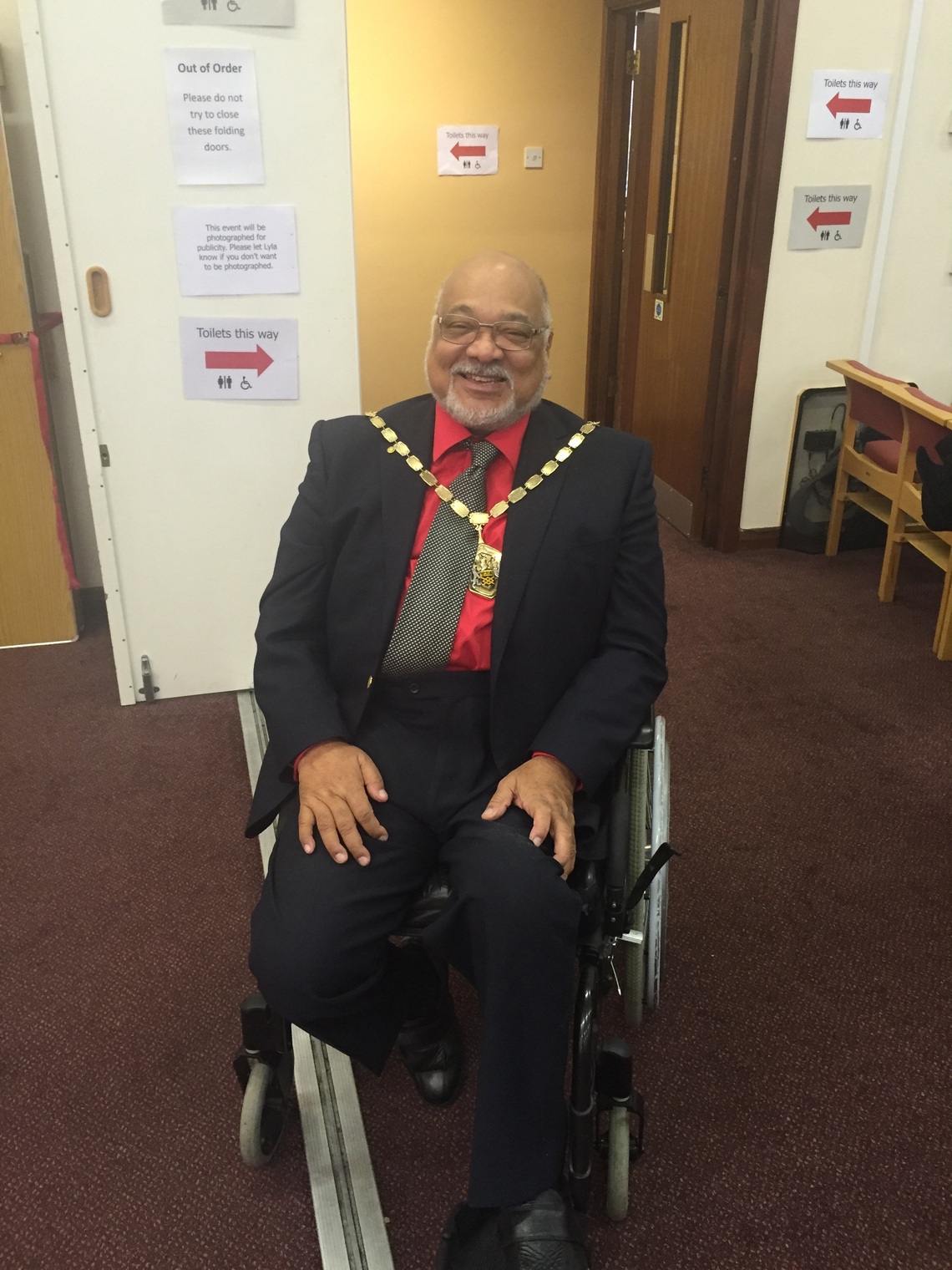
Mayor of Merton Councillor David Chung who opened the event
Annual General Meeting 2015
World Food Bring and Share, and Annual General Meeting 29th September 2015
Under Construction
Time: 11am – 1pm. Venue: Merton Vision, The Guardian Centre
At Merton CIL we want to celebrate the wonderful diversity of our members, volunteers, and staff. As part of our Annual General Meeting we’re inviting everyone to “bring and share” their favourite dish. Whether it’s rice and peas or sticky toffee pudding, bring something along to share with your fellow members for lunch after the formal business. Plus! Come and meet the staff and trustees and find out what we’ve been up to over the past year at Merton CIL.
Mayor of Merton’s Charity Calendar Competition
In the Summer of 2015 the Mayor of Merton, Councillor David Chung, launched a competition to design pages for his 2016 Charity Calendar. The Competition is now closed, but you can buy the amazing calendars for just £5 from the Mayor’s office, from Merton CIL offices, or from the Fayre and Square volunteer shop in Centre Court Shopping Centre, Wimbledon. Find out more here
The Merton CIL Sponsored Walk
We raised over £2,000 at our sponsored walk in June 2015 and we're very grateful for the support of everyone who took part as walkers, volunteers, spreading the word or donating!
Read more about the walk here
Quiz Your Parliamentary Candidate Events – What Did They Say? 2015
On 9th March 2015 Merton CIL, Merton Seniors Forum, Merton Mencap and Age UK Merton invited the main General Election 2015 candidates for Mitcham and Morden to answer questions from you, on the issues you care about. On 9th April 2015 we invited the Wimbledon candidates to be quizzed by our members too.
The quiz the candidates 'Hustings' events for Mitcham and Morden was run on Monday 9th March 2015 from 1.30pm to 3.30pm at The Vestry Hall, Mitcham. Scroll down for a summary, or read more about it here
The quiz the candidates 'Hustings' event for Wimbledeon was was run on Thursday 9th April 2015 from 10.30am to 12.30am at Holy Trinity Church, Wimbledon. Scroll down for a summary or read about it here
All candidates were issued guidelines for candidates these ahead of the events, and all attendees got a hustings agenda and ground rules when they arrived on the day.
You can read the documents below:
Hustings agenda and ground rules
Registration Drive
Our registration drive was linked with Operation Disabled Vote and in 2 hours outside the Civic Centre we spoke with 223 people, helped 10 people to register, and gave registration forms to another 11 people to complete later. 5 people we spoke to refused point blank to register as they didn't want to vote and didn't think it was worthwhile. We found it worrying that 12% of the people we spoke to on the day weren't registered to vote. You can register to vote on the following link here.
There are some photos from the day taken by Merton Council, here.
Press coverage
There was some local and national press coverage including:
Wimbledon Guardian article about the Mitcham and Morden Hustings here
Disability News Service Coverage of Mitcham and Morden Hustings here
South West Londoner article on Wimbledon Hustings here
South West Londoner article on our drive to get people to register to vote here
Summary of Mitcham and Morden Hustings
58 people turned out to hear what the candidates had to say.
The candidates covered a lot of ground in their initial speeches, with some of the audience feeling they spoke too fast. It was noticeable that there was almost as much blaming each others' policies and record, as there was setting out what each of the parties would actually do. However, when it came to the questions from the audience, several people commented that it was hard to tell much difference between the candidates. "The differences are paper thin" said one audience member.
Lots of questions were asked of the candidates ranging from issues of accountability, housing, education, health, slavery, social care, benefits, employment, coalition plans, sovereignty of Parliament and changes to the Independent Living Fund.
Candidates all planned to integrate health and social care but none would commit to universal social care free at the point of use, while still insisting the NHS would remain free. None of the candidates made a commitment to Save the ILF.
2/3 of people who attended the hustings said they now feel better informed about the candidates and their policies.
Find out more about what was said at the Mitcham and Morden hustings here
Summary of Wimbledon Hustings
73 people attended this event which led to some people having to stand as there wasn't enough room!
Candidates covered a range of issues in their speeches with most focusing on justice, austerity, social issues and disability as they tried to anticipate the audiences' interests. There was also a strong focus on local issues which were almost on a par with national issues in candidates' speeches and their responses to questions.
Questions were extremely wide-ranging from Trident, TTIP, education, hate crime, to the integrity of MPs. There was considerable focus on austerity and candidates’ plans for disabled people, as well as plans around mental health. A number of questions asked about the future of the Independent Living Fund with the audience seemingly getting frustrated as it was difficult to pin the candidates down to concrete answers. The only candidate to commit to saving the ILF was the Green candidate.
80% of people who attended the hustings said they now feel better informed about the candidates and their policies, although, as one person said, "better informed, yes, but I didn't like what I heard".
Find out more about what was said at the Wimbledon Hustings here
Panel Discussion on the Experience of Disabled People from BME groups 19th March 2015
This is a learning and information sharing event for:
- Anyone interested in the topic or wanting to share their experience
- Disabled organisations who want to ensure they are accessible across all ethnic groups
- BME-focussed organisations to increase their understanding of the experience
Find out more here (under construction)
My Voice Matters 2014!
‘My Voice Matters: My Inclusion Matters’ was the third annual debate hosted by Merton Centre for Independent Living. We explored issues which our members and service users had highlighted during the past year, and worked together to identify potential solutions around inclusion and access in Housing, Employment, Health and the built Environment.
Read more about the event here
Sing for your Supper and Annual General Meeting 2014
Under construction here
My Voice Matters 2013!
‘My Voice Matters: Listen to My Demands’ was the second annual debate hosted by Merton Centre for Independent Living. We asked deaf and disabled people in Merton to come and have their say on the issues that matter to them. The main issues covered were Access and Inclusion, Education, Welfare and Housing, and Employment.
Read more about what happened on the day here
Tea Dance and Annual General Meeting 2013
We enjoyed our Tea Dance with members, as well as the formal business of our AGM.
Read more about it here (under construction)
My Voice Matters 2012!
Over 50 people joined us at the first in the series of 'My Voice Matters' debates hosted by Merton CIL December 2012
Listen to the debate here (links to external website):
My Voice Matters Debate Introduction and Transport Debate - https://www.dropbox.com/s/xnqn6afccnyc9ed/My%20Voice%20Matters%20intro%20and%20Transport%20debate%207%20Dec%202012.WMA
My Voice Matters Welfare Debate and Close - https://www.dropbox.com/el/?r=/s/jiksnxbnf7tljwv/My%2520Voice%2520Matters%2520Welfare%2520debate%2520and%2520close%25207%2520Dec%25202012.WMA&b=clk:142236396:4665826002497917634:1124:558&z=AADS3AMOHetnOdizn2UH1pZo3aMv-7Sr2_PAbx2WUcFNag
Friday 7th December 1pm - 5pm at Drake House 44 St George's Road, SW19 4ED
We had our say on Transport issues in Merton, and on Welfare Reform
Met representatives from Transport for All, Merton Bus Garage, Disability Rights UK and the Department for Work and Pensions
Plus enjoyed wonderful music by musician & disability rights campaigner John Kelly, catering by Merton Mencap, and artwork supplied by Merton Mencap, Wimbledon Guild Art Group, Merton Adult Eduction Art Group and Merton Vision Art Group
Celebrating Independent Lives Roadshow 2012
In December 2012 we ran a roadshow around Merton to let people know our plans for Merton CIL, and get to meet people.
Read about our roadshow here
Our First Annual General Meeting 2012
TBC

